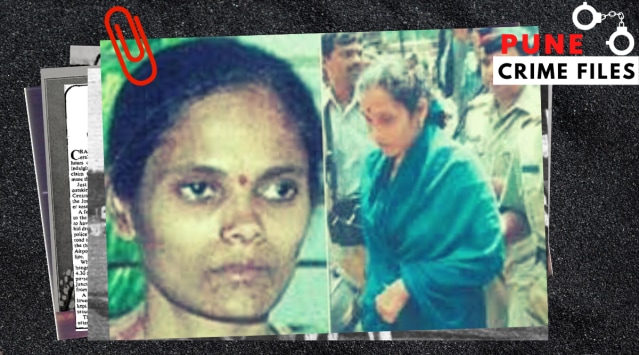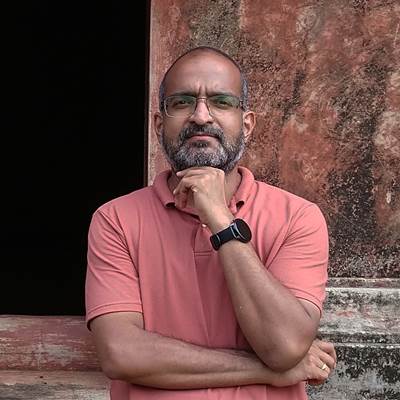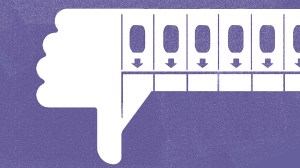Pune Crime Files: How cops got to woman and her daughters who kidnapped children, used them for thefts before killing them
Anjanabai Gavit and her two daughters, Seema and Renuka, kidnapped children from various places and used them to divert people’s attention before stealing and escaping or as a reason for mercy after getting caught while stealing.
 “There are the two turning points in the tale of Anjanabai Gavit and her two daughters, Seema and Renuka,” says Suhas Nadgauda, a police inspector with the Maharashtra Criminal Investigation Department (CID) in the late 1990s. (Express photo)
“There are the two turning points in the tale of Anjanabai Gavit and her two daughters, Seema and Renuka,” says Suhas Nadgauda, a police inspector with the Maharashtra Criminal Investigation Department (CID) in the late 1990s. (Express photo) “There are the two turning points in the tale of Anjanabai Gavit and her two daughters, Seema and Renuka,” says Suhas Nadgauda.
Nadgauda, a police inspector with the Maharashtra Criminal Investigation Department (CID) in the late 1990s, was part of a team of officers that probed the serial kidnappings and murders of children aged between nine months and four years, which were orchestrated by the mother and her two daughters from 1990 to 1996 at various locations in Pune, Kolhapur, Nashik, Kalyan and Thane.
“The first turning point was when the sisters snatched a purse at Chaturshringi temple in Pune in April 1990. And the second was an accidental encounter in a market in Nashik in October 1996,” he says.
Nadgauda, 59, who retired from service in March last year as additional superintendent of police from the Maharashtra Anti Corruption Bureau, says, “The inhuman kidnappings and savage murders committed by the mother, her two daughters along with the husband of one of the daughters, were investigated and prosecuted at the time when the clues and electronic evidence like the security camera footage and cell phone records were not even in the picture. I can confidently say it was an example of painstaking investigation and meticulous prosecution. Being part of the investigation of the case was a turning point for me too — not just as a police officer but as a human being and for many around me who were part of the probe.”
The two half-sisters — Renuka Shinde, 57, and Seema Gavit, 51 — who are currently lodged at Yerawada Central Jail and their late mother Anjana, were habitual thieves, according to the police. The probe at the time revealed they kidnapped children from various places and used them to divert people’s attention before stealing and escaping or as a reason for mercy after getting caught while stealing.
Because of its expanse, the case was probed by a team of officers from the Maharashtra CID. “By 1990, the mother and daughter had become habitual offenders involved in street thefts and pickpocketing. In April 1990, Seema, Renuka and Renuka’s son from her first marriage went to the Chaturshringi temple in Pune.
Taking advantage of the large crowd at the temple, Renuka tried to snatch a purse but was caught. Renuka, at this point, kept her toddler son at the feet of the person who had caught her and started begging for mercy, saying they were stealing so they could feed the child,” Nadgauda said.
“This, I believe, was the first turning point in this story. At this point, the daughters and mother realised they could use children as a distraction or use them to plead for mercy after getting caught. For the next six years, they kidnapped multiple children. They used the children for thefts and pickpocketing and either abandoned them or killed them after a while when it became difficult to take care of them,” he said.
A probe revealed that in July 1990, they kidnapped the one-and-half-year-old son of a woman beggar at the Kolhapur bus stand. The trio promised the woman to get a job and asked her to accompany them on a bus to Karad town and then kidnapped the child during the journey. They named him Santosh. After using him for multiple thefts, they killed Santosh sometime in February 1991 when the boy sustained an injury and incessantly cried.
The investigation revealed that for the next six years, Anjanabai, Renuka, Seema and Kiran shifted locations frequently accompanied by Renuka’s own children. They continued kidnapping children, boys and girls, on two occasions, two at a time.
“Piecing together the case was a major challenge. As three of the kidnappings were in Kolhapur — most in one place among the many locations, including Pune, Nashik, Thane and Kalyan — and because the first was in Kolhapur, the combined trial was held at the sessions court in Kolhapur. We had to build an entire sequence of events, date by date, corroborated by witness statements. During the trial, 156 prosecution witnesses were examined, and not even one of them turned hostile,” Nadgauda recalled.
The probe revealed that in 1995, the mother, two daughters, Kiran and their children moved to Nashik to escape the police watch on them for their thefts in Pune.
In Nashik, sometime around August or September, they kidnapped a girl named Kranti, the daughter of Anjanabai’s estranged husband, Mohan Gavit, from his other marriage. Kranti was kidnapped primarily as revenge because the family was nursing a grudge about Mohan Gavit for leaving Anjanabai for another woman.
According to the police, Kranti was picked up from her school by Renuka and Seema on the pretext of taking her to meet Anjanabai. They killed her a few months later at Narsobachi Wadi in Kolhapur. Kranti’s disappearance was initially treated as a missing persons case and later as kidnapping when it came to light that Seema and Renuka had picked her up from school. It was treated as kidnapping till October 1996, when the three women and Kiran were finally arrested. Even after Kranti, the kidnappings and murders of children continued.
Nadgauda said, “The second turning point was an accidental encounter at a market in Nashik on October 20, 1996, when Mohan Gavit’s wife Pratibha spotted Renuka and Seema. The police were informed and Renuka, Seema, Anjanabai and Kiran were arrested. They revealed that they had murdered Kranti. The series of murders and kidnappings then came to light during their interrogation and subsequent investigation. Even so many years since the case, it is still difficult for me to tell this story, which I believe has had a deep impact on the people’s psyche at times and in years to come.”
In November 1996, Anjana, Renuka and Seema were arrested along with Renuka’s husband Kiran Shinde, who later turned an approver in the case. They were charged with 13 kidnappings of children, the murders of nine of them and the attempted kidnapping of one more child, which occurred between June 1990 and October 1996.
In 1997, Anjana, who was at the time in her early 50s, died of cardiac arrest before the trial began. The two half-sisters were sentenced to death in 2001 by a court in Kolhapur for the kidnappings and murders of six children. The high court upheld their sentence for five murders. In 2006, the Supreme Court upheld the death sentence and in 2014, their mercy petition was rejected by then President of India Pranab Mukherjee.
A few years later, the sisters moved the Bombay High Court to commute their death sentence to life imprisonment, citing ‘inordinate delay’ in deciding on their mercy pleas and execution of their death sentences. After concluding the hearing in December 2021, a high court division bench ruled in January 2022 that the two sister’s death sentences be commuted to life term.













